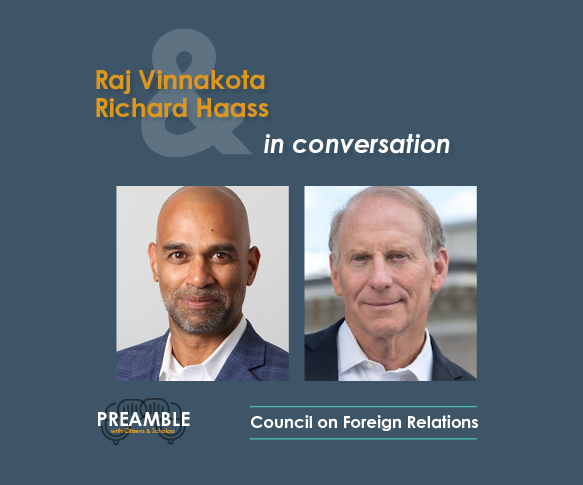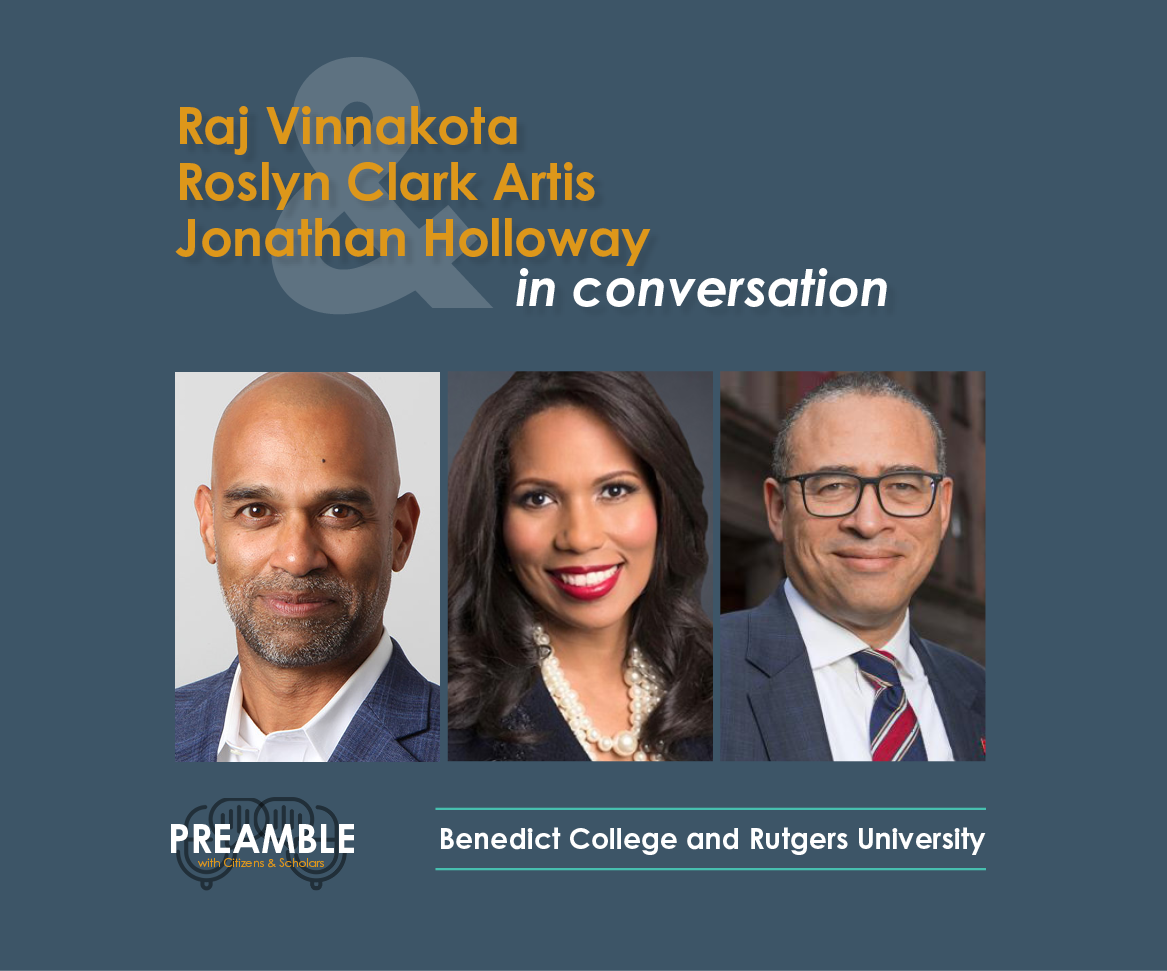Share
In this urgent moment for our nation, we can strengthen democracy—together. Raj Vinnakota, President of the Institute for Citizens & Scholars, sits down with diverse leaders to learn about their work and hear their ideas for shaping a more perfect Union. Here, Raj talks with Eboo Patel, Founder and President of Interfaith America. Below is an edited excerpt from the conversation.
Raj Vinnakota: You’ve been leading Interfaith for 20 years now, which is just amazing, and congratulations. I’m curious, what inspired you to get started on this, and then what inspires you to keep the work going every day?
Eboo Patel: As Alasdair MacIntyre might say, there are stories that I belong to in which pluralism is a central feature. I belong to the story of the Ismaili interpretation of Islam. In Islam in general, the idea of people from, as the Quran says, different nations and tribes getting to know one another is a central feature. And in the Ismaili interpretation of Islam, this small Shia community that I belong to, it’s even more salient because our spiritual leader, the Aga K, speaks about pluralism so frequently.
So that is a story that I belong to, and I feel a responsibility for helping live out the next chapter of that. I belong to the story of America, and we are the world’s first attempt at diverse democracy. The dimension of diversity that the Founders of the 1776 generation paid the most attention to was religious diversity and the one that they came the closest to getting right. I feel like I am part of the next chapter of what does America as a religiously diverse democracy look like. I’m also a social entrepreneur and since high school, I just started things and it occurred to me in the mid-1990s that there wasn’t enough attention paid to the connection between faith, diversity, and social change. I started this and then it just kept going and going and growing and growing. So here I am. What keeps me going? I mean part of it is I love the long arc. Part of it is the world needs the work of cooperation across difference. And part of it is I also love the day-to-day. Like Gwendolyn Brooks says, “Live not for the end of the song, live in the along.”
“I belong to the story of America…I feel like I am part of the next chapter of what America as a religiously diverse democracy looks like.”

Raj Vinnakota: In Sacred Ground you wrote, “Pluralism is not a birthright in America, it’s a responsibility. Pluralism does not fall from the sky; it does not rise up from the ground. People have fought for pluralism; people have kept the promise. America is exceptional not because there is magic in our air, but because there is fierce determination in our citizens.” Where does pluralism play a part? You allude to it with the Founders but talk about this a little bit more.
Eboo Patel: Yeah, so that’s a good paragraph. I’m proud that I wrote that. So look, I was just at the University of Illinois at Chicago this morning. I met with the chancellor there and on that campus is the Jane Addams Hull House Museum in the building where she first built Hull House. So here’s this woman, in her mid-late twenties in Chicago in the late 19th century, 1880, in a city that Max Weber once said, “Being in Chicago is like seeing a man with his skin peeled off.” That’s how raw the city was. And she is seeing these immigrants pour in from southern and eastern Europe and she’s seeing all these natives in Chicago and elsewhere be brutally excluding to these immigrants. And she says, “I’m going to build a place where not only do you feel welcome, but you can cooperate together, and you can be contributors.”
She builds that place over a half-century. Hull House and the ethic that is established three becomes an entire layer of American democracy that we basically take for granted. So that’s fierce determination. And one of the things that distinguishes Jane Addams is she wasn’t somebody who went around principally telling other people what they were doing wrong. Jane Addams wasn’t part of the resistance. Jane Addams was a builder. Jane Addams created something better. She wasn’t principally an arsonist against the old system. She was principally an architect of the new system. And so, I think about all the people like Jane Addams, all the people who build places where people from different identities and divergent ideologies can cooperate together. That’s who I want to be.
Raj Vinnakota: How should and how has higher ed done in building architects instead of arsonists?
Eboo Patel: So I think the long trajectory of higher ed on this is good. Most of the architects of our civil society come out of higher ed. Many of them would say that their formative experience in connecting with people who are different from them and then learning the vision, knowledge base, and skill set of creating things is from their college or grad school experience. I think that’s super important. I do think that a social change paradigm has basically embedded itself in higher ed over the past few years, which privileges the fist in the air over the extended hand. It privileges the “tear things down instead of build things up,” it privileges critique over creation. And look, I think that a controlled burn is sometimes important for positive change, but a social change ecosystem cannot have a hundred arsonists for every architect.
“I think that a controlled burn is sometimes important for positive change, but a social change ecosystem cannot have a hundred arsonists for every architect.”

Raj Vinnakota: What would be the core elements to building architects or tell me where you’ve seen those core elements?
Eboo Patel: Couple things that we tell campuses they should do. Number one, use a case study approach to the development of leaders in the same way a medical school or a business school would. Like here is an actual situation. There is a knockdown, drag-out fight over drag queen story hour in the library in Lake Luzerne, New York. You are called in to create cooperation in this community and the stakes are stark. The library is now closed because the staff was so traumatized by this fight that they couldn’t come back to work. In fact, some were hospitalized and nobody else applied for those jobs. You were called in to nurture cooperation. What would you do? So I think this kind of case study approach, which is like you are a leader in this situation.
You can’t say to the police, “Hey, you did a terrible job.” You can’t only say that “you are the one responsible for public safety.” What does that look like? So a case study approach, which puts students in the driver’s seat as far as being leaders goes, I think is important. The second thing I think is important is to study the history of change makers who were architects – to study the Jane Addams, Paul Farmers, Wendy Kopps and Bill Draytons of the world. How did those people build things? How did the Mayo Clinic come to be? I think that those are hugely important stories, hugely important people to study. We think about social change very often as a fist in the air and getting rid of bad stuff, but really social change is building better stuff.
Raj Vinnakota: Love the idea of stories. And you do stories about as well as anyone I know. I mean I guess it’s part of the preacher, the minister in you. There’s one that I recently heard you say that, at least to me, had tremendous salience. Talk to me about football versus baseball.
Eboo Patel: Yeah, so I think there are different kinds of diversity work and there’s a kind of diversity work that is principally about telling other people what they’re doing wrong. It’s about critique. It’s about encouraging people to be dissatisfied with the current situation. I think that there’s value to that. There’s a kind of social change work which points fingers at people doing wrong. I think that there can be value to that. There’s a type of social change work, which is always about analyzing power dynamics. I call that package of things football. And football has a season and it has a stadium, right? It has its own rules, it has its own equipment, it has its own practices. I call the kind of diversity work that privileges building relationships across difference, that privileges the extended palm over the raised fist, that asks people to ask questions and tell stories that are characterized by curiosity—I call that baseball.
And I basically said to a college campus, in fact, I said it this morning, your athletic department should have both a baseball team and a football team. And right now we’re heading into baseball season. Right now in American life, it’s the time for pluralism. And here’s the thing, you can’t hand a baseball to football players. They don’t know what to do with it. It’s the very rare Bo Jackson of the world because if you are accustomed to shaping your hand into a fist against people, you haven’t built the muscle of extending it into an open palm towards people, you’re not bad. You’re just a football player and it’s baseball season. And by the way, we’re not going to let you tackle the baseball players.
Raj Vinnakota: The fundamental precept there is the one that you just mentioned, which is it is now baseball season. Tell me what gives you a sense of certainty or as close to certainty as you can get that we’re now in baseball season and not in football season.
Eboo Patel: So many institutions in American life that we just expect to work are melting down over disagreements. We pull headlines from The New York Times and The Washington Post on this school board meeting in Burbank, California— ends in a screaming match because people can’t agree on what’s supposed to be on the required reading list. High school play is canceled in Ithaca, New York because people can’t agree on which identities can be cast into what roles. City council in Teaneck, New Jersey is unable to approve new business licenses because there’s such fractiousness between Muslims and Jews over the war in the Middle East. So, imagine if your house was on fire and you call the fire department and they were like, “Hey, who’d you vote for? And we’ll come if we like the answer.” Imagine if you had a heart surgery and you walked into the hospital and they were like, “Hey, who’d you vote for? And we’ll operate on you if we like the answer.” There are societies like that. The cooperation that we enjoy in American life should not be taken for granted. It should be cherished; it should be protected. It should be strengthened.
“Imagine if your house was on fire and you called the fire department and they were like, “Hey, who’d you vote for? And we’ll come if we like the answer.” Imagine if you had heart surgery and you walked into the hospital and they were like, “Hey, who’d you vote for? And we’ll operate on you if we like the answer.”

Raj Vinnakota: A quick rapid-fire round to close out this conversation, and I’m going to feature it around what we call the “Big Three” of being a well-informed, productively engaged, and committed citizen in this country. And so I’m just going to ask you three quick questions. Tell me the first thing that comes to mind for you. What makes you optimistic about our democracy?
Eboo Patel: I’m dispositionally optimistic. I seek out the stories that give me hope.
Raj Vinnakota: How do you actively engage in the local community? And can you tell me about a meaningful experience of active engagement?
Eboo Patel: So both my boys have played sports. If I’m not on a basketball court or on a baseball diamond, I’m probably heading towards one. And that’s the community of people that if somebody’s spouse dies, comes together around that person. In order for you to do something positive for your kid, you have to be part of a team. The kid has to be part of a team. If you want to be part of a team, you have to be part of a community that supports that team. You have a community that supports that team, then that community supports other things. It’s an excellent description of how civil society actually works.
Raj Vinnakota: Really interesting. You and I have shared these stories. I do the same. And I think for most of the parents that I’m with, I don’t even know what their job is, their vocation.
Eboo Patel: But you do anything for their kid, right?
Raj Vinnakota: Absolutely.
Eboo Patel: And I actually think that is the ethic that I think we cannot lose in American life. Do you know who the people voted for? Nope.
Raj Vinnakota: I don’t.
Eboo Patel: And you might really disagree with who they voted for, but are you going to let it destroy the volleyball team?
Raj Vinnakota: My relationship with those parents now over multiple years – it’s not. Because I know them three-dimensionally, so it’s pretty powerful. Last question. How do you continue to grow your own civic knowledge base?
Eboo Patel: I mean, I wake up in the morning at like 5, 5:30 and I just read 12 newsletters or eight newsletters, and I travel a lot to give talks, but you give talks, you listen a lot too. You listen in Q and As, you listen at dinners, you pay attention to things. So I am a sponge for American civic life and intellectual life and arts life.
Explore More Preamble
Stay Engaged
Get More News
Join our mailing list to get more news like this to your mailbox.
Support Our Work
Help us invest in the talent, ideas, and networks that will develop young people as effective, lifelong citizens.
Ways to Support Us
